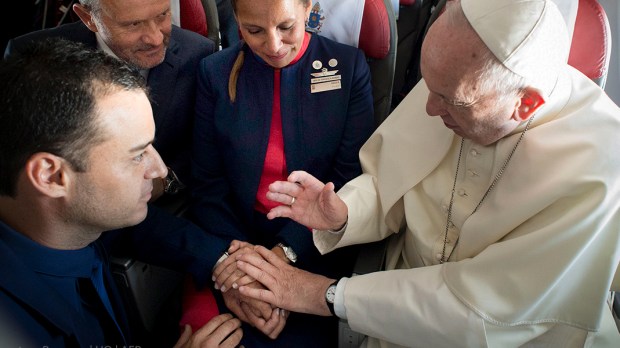While many people are excited for Carlos and Paula, the airline crew members who were married yesterday by Pope Francis, others are wondering why the pope would have performed such an unconventional ceremony.
How did he know the couple was adequately prepared for the sacrament? ask commenters on social media. Others note, “And in a plane?”
While these questions can lead us to a deeper understanding of the requirements of marriage and the normal liturgical and canonical stipulations, there is a cultural element that can help to put the pope’s decision in context.
It’s also helpful to consider what the groom reported as being the pope’s intention:
What he told us was very important: This is the sacrament that the world needs. The sacrament of matrimony. Hopefully this motivates couples around the world to receive the sacrament. That’s why I’m doing this. That’s what he told us.
The cultural context: In most of Latin America, as in most of Europe, priests do not have legal authority to officiate at a civil marriage. Thus, couples have an initial ceremony before a judge (often with close family members, as well as the legal witnesses required). This civil ceremony, rendering the couple married in the eyes of the government, is usually one of the parish requirements before the sacrament of matrimony is administered (the way a birth certificate is often required before a baptism). Then at some point, after the civil ceremony — sometimes within days, other times within months — the couple goes on to receive the sacrament of marriage.
Well-catechized couples realize they are not married in the eyes of God and the Church until they’ve received the sacrament (had the “church wedding” — technically known as the convalidation of a marriage), thus they view the civil service as something of a formality and do not begin living together until they’ve been sacramentally united.
However, too often and for a variety of reasons, some couples never proceed to receive the sacrament. Sometimes they don’t seek legal recognition either, and establish common-law unions.
There can be many reasons for this, from the secular devaluing of a church wedding, to more practical issues. Often, an impediment is money, since couples want to celebrate a church wedding with dinner and dancing, etc. Sometimes a lack of priests makes obtaining the sacrament difficult.
Missionaries who travel especially to poor or rural Latin American communities will often survey couples to see if they are only common-law married or civilly married, and to see if they would like to receive the sacrament of matrimony. Often, group weddings will be held to facilitate these couples receiving the sacrament.
(These couples are usually aware that they should not receive the Eucharist since their relationship is not sacramental, and will have spent years refraining from Communion.)
This need also translates to Hispanic immigrant communities in the United States.
For example, one priest in Maryland has developed a tradition of celebrating group weddings, in order to help these couples right their relationship with the Church.
Father Leandro Fazolini said that for different reasons and obstacles, the couples, many of whom have been together 10 years and in some cases as long as 20, had never received the blessing of the church. For many, the cost of a conventional wedding was too high; others had put it off, hoping one day to receive the sacrament in their country of origin. “Many of them use the excuse of not getting married,” Father Fazolini said, “because of the many years of life together, which in their culture would be a shame since (marriage is viewed positively for) young couples and not so much for older couples. The idea of having the community wedding is to break these walls and make it easier for them to receive the grace of the sacrament.”
This can help us understand the pope’s willingness to bring Carlos and Paula into a regularized situation on the plane, enabling them to receive the graces of the sacrament of matrimony.
Read more:
WATCH: Convalidating a marriage in the Catholic Church
UPDATE:

